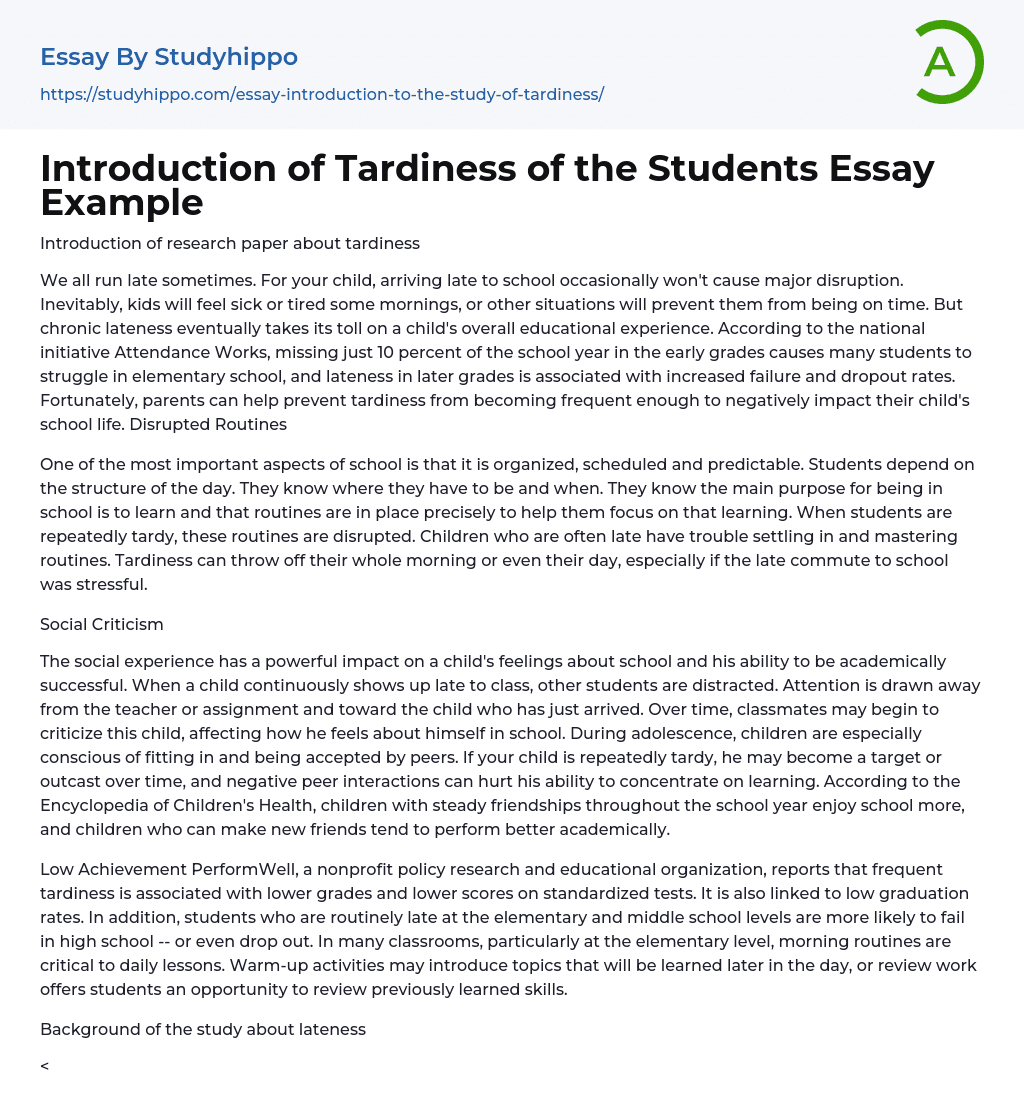Introduction of research paper about tardiness
We all run late sometimes. For your child, arriving late to school occasionally won't cause major disruption. Inevitably, kids will feel sick or tired some mornings, or other situations will prevent them from being on time. But chronic lateness eventually takes its toll on a child's overall educational experience. According to the national initiative Attendance Works, missing just 10 percent of the school year in the early grades causes many students to struggle in elementary school, and lateness in later grades is associated with increased failure and dropout rates. Fortunately, parents can help prevent tardiness from becoming frequent enough to negatively impact their child's school life. Disrupted Routines
One of the most important aspects of school is that it is organized, scheduled and predictab
...le. Students depend on the structure of the day. They know where they have to be and when. They know the main purpose for being in school is to learn and that routines are in place precisely to help them focus on that learning. When students are repeatedly tardy, these routines are disrupted. Children who are often late have trouble settling in and mastering routines. Tardiness can throw off their whole morning or even their day, especially if the late commute to school was stressful.
Social Criticism
The social experience has a powerful impact on a child's feelings about school and his ability to be academically successful. When a child continuously shows up late to class, other students are distracted. Attention is drawn away from the teacher or assignment and toward the child who has just arrived. Over time, classmates may begi
to criticize this child, affecting how he feels about himself in school. During adolescence, children are especially conscious of fitting in and being accepted by peers. If your child is repeatedly tardy, he may become a target or outcast over time, and negative peer interactions can hurt his ability to concentrate on learning. According to the Encyclopedia of Children's Health, children with steady friendships throughout the school year enjoy school more, and children who can make new friends tend to perform better academically.
Low Achievement PerformWell, a nonprofit policy research and educational organization, reports that frequent tardiness is associated with lower grades and lower scores on standardized tests. It is also linked to low graduation rates. In addition, students who are routinely late at the elementary and middle school levels are more likely to fail in high school -- or even drop out. In many classrooms, particularly at the elementary level, morning routines are critical to daily lessons. Warm-up activities may introduce topics that will be learned later in the day, or review work offers students an opportunity to review previously learned skills.
Background of the study about lateness
Responsibility Part of your child's education is learning to be responsible. The school experience teaches children how to meet expectations. They learn to follow schedules, obey rules, complete assignments and keep track of their materials. Learning responsibility in school is a precursor to functioning in the working world, as noted by William Kirby in his 2010 Dayton Daily News article "School Attendance Tied to Academic Success." Attendance is one of the ways children show they can meet their obligations. In many cases, a child's attendance
depends on his parents' ability to help him be on time. Parents can teach their kids organizational techniques that will help them get out of the house faster, such as packing their bags and laying out their clothes the night before school. But parents who drive their children must also remember to be punctual and responsible. After all, you are the primary role model.
- School Types essays
- Child essays
- Child labor essays
- Childcare essays
- Arranged Marriage essays
- Communication essays
- Conflict Management essays
- Conflict Resolution essays
- Connection essays
- Conversation essays
- Dating essays
- Friendship essays
- Mediation essays
- Classroom essays
- College essays
- E-Learning essays
- Elementary School essays
- Examination essays
- Graduate School essays
- High School essays
- History Of Education essays
- Homeschooling essays
- Kindergarten essays
- Middle School essays
- Public School essays
- School essays
- Single Sex Schools essays
- Special Education essays
- Student essays
- Teacher essays
- University essays
- Vocational Education essays




